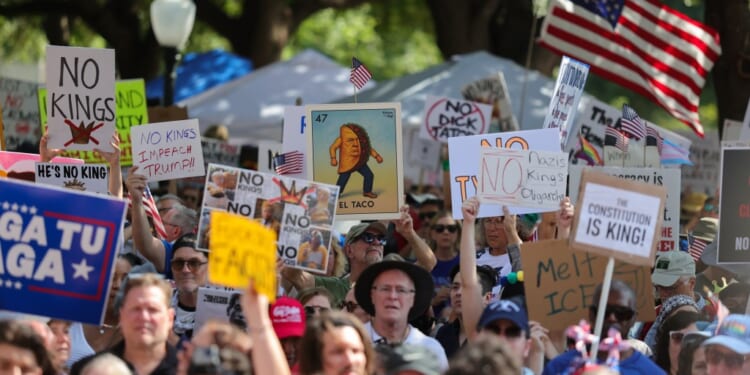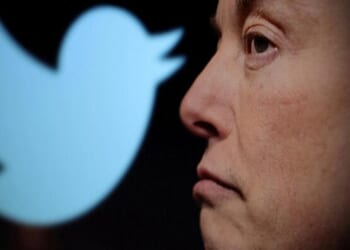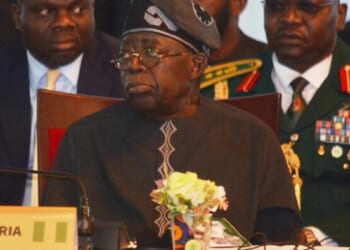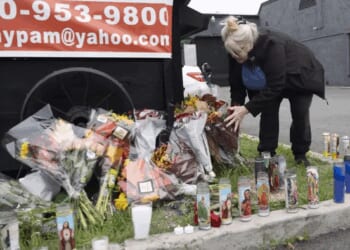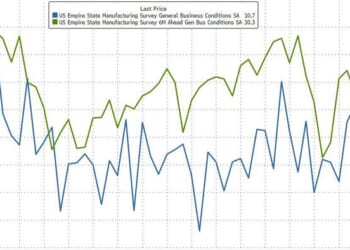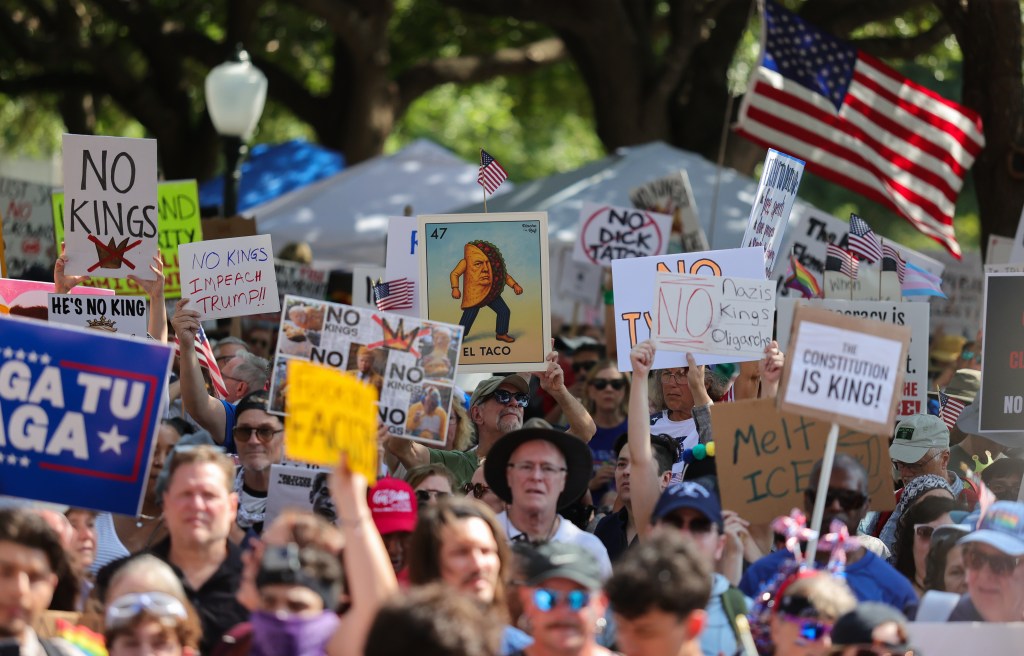
In all likelihood, Saturday’s nationwide “No Kings” protests against Donald Trump should go off without a hitch, without widespread violence, and without much to show for their effort to stop a man they consider to be an authoritarian president. So why are Republicans in Washington making such a big fuss over it?
Transportation Secretary Sean Dufffy said Monday that this weekend’s coming protests were “part of antifa.” Republican leaders on Capitol Hill have referred to the events as a “Hate America” rally and also claimed that “antifa” was involved. Rep. Tom Emmer, the Republican whip, described the protest organizers as the “terrorist wing” of the Democratic Party and said they represented “the most radical, small, and violent base in the country.” And Treasury Secretary Scott Bessent on Wednesday referred to the “crazy No Kings rally this weekend,” warning it would be “the farthest left, the hardest core, the most unhinged in the Democratic Party.”
That’s some shockingly harsh rhetoric about a protest that hasn’t even happened yet. The No Kings organizers, meanwhile, are laughing it off. “Appreciate the free publicity,” Leah Greenberg, the co-executive director of the progressive group Indivisible, told me.
Indivisible is one of the main groups organizing No Kings, along with a coalition of national and local activist groups, labor unions, and traditional Democratic allies like the League of Conservation Voters, the ACLU, and Planned Parenthood. More than 2,500 demonstrations, from small-town sign-waving get-togethers to massive urban marches, are in the works, the second such event of Trump’s second term. If Saturday’s events look anything like the June protests, which took place on June 14—Trump’s birthday and the same day as the Washington, D.C., military parade celebrating the Army’s 250th anniversary—we should expect few or no unhinged terrorists in balaclavas causing chaos but plenty of gray-haired liberals on busy street corners with handmade signs and NPR tote bags.
“I certainly think that Donald Trump did not appreciate the contrast between an incredible bummer of a military parade in Washington, D.C., and 5 million people all over the country telling him that he is not their king,” Greenberg said.
Whether or not they annoyed the president, it’s clear those June demonstrations did nothing to change the authoritarian trajectory of his presidency. Trump’s government has not ceased its ruthless immigration enforcement and crime prevention efforts. He’s brought the National Guard into the nation’s capital and continues to attempt to do so in other American cities. Trump’s Justice Department and regulatory agencies are going after his political opponents. And with a pliant Congress watching, Trump has asserted more executive authority to make spending cuts to the federal government and carry out aggressive military action against foreigners without much explanation or oversight.
So if the first No Kings day was so obviously ineffective, why are the Trump administration and its Republican allies making such a federal case—and, darkly, suggesting there will be violence—out of this second iteration?
For starters, there is a short-term political strategy at work. Each Republican who has criticized the No Kings protests has linked it to the ongoing government shutdown, arguing that the far-left organizers are what’s keeping Democratic leaders like Sen. Chuck Schumer from reaching a spending deal agreement. Before she introduced Duffy on her show Monday, Fox Business host Maria Bartiromo claimed that “sources” told her “one of the reasons the government is still shut down is because Chuck Schumer and the Democrats want to join the No Kings rally.” Duffy added that “Chuck Schumer’s not running the show. The No Kings protesters or organizers are running the show.”
That’s textbook partisan rhetoric, of course: turn each story into an opportunity to talk about your issue on your terms, and what Republicans want to discuss is Democratic intransigence. Right now, that’s the No Kings protests. Next week, it may be something else.
But the references to antifa and the “terrorist wing” of the Democratic Party sound a little more sinister in light of some of the other actions being taken by this administration. “Some of what they’ve said, particularly the suggestion that these protests are violent before they even happen, questioning who is funding them, that fits into a pattern of rhetoric we’ve been seeing from the administration that broadly links left-leaning advocacy to violence or some vast organized terrorist network,” Aaron Terr, the director of public advocacy at the Foundation for Individual Rights and Expression, told me this week.
It’s not only rhetoric but action in the form of executive orders, including last month’s designation of antifa as a domestic terrorist organization. What is antifa? The term, short for “anti-fascist,” refers to the loose coalition of anti-right-wing activists, groups, and militants, one lacking any central leadership or identifiable cohesion. Who is antifa? The executive order describes its adherents as those who use “illegal means to organize and execute a campaign of violence and terrorism nationwide” to further the downfall of the United States government.
It doesn’t sound like what the organizers of No Kings, who insist they want to hold a “peaceful protest” and have encouraged attendees to bring American flags and other symbols of the United States, have in mind. But does that matter if Republican officials are likening the two?
Terr says what’s more alarming is the national security memo issued alongside that antifa designation, in which Trump calls for his administration to adopt a “new law enforcement strategy that investigates all participants” in a broad range of activities that breezily links actual violent threats against public figures like Trump, Supreme Court Justice Brett Kavanaugh, and activist Charlie Kirk to those advocating specific viewpoints, including “extremism on migration, race, and gender” and “hostility towards those who hold traditional American views on family, religion, and morality.”
“The concern here is that the administration is blurring the line between speech and violence in a way that’s politically expedient but dangerous for civil liberties,” Terr said. “Because they’re seizing on incidents of political violence and then linking them to this broader universe of left-wing advocacy and kind of vaguely portraying it all as part of some big, shadowy conspiracy involving like this vast network of activists and donors.”
And that’s exactly what appears to be motivating the installment of a Trump ally at the Internal Revenue Service’s criminal investigative division, which the Wall Street Journal first reported on this week. A top aide to Bessent is heading over to the IRS to replace a longtime career official in order to “pursue criminal inquiries of left-leaning groups more easily.”
All of that context suggests a much more disturbing method to the madness of Republicans trying to define a large, disparate, and expressly peaceful demonstration into something worse than it is.
“They don’t want big popular protests with everyone bringing their kids and dogs out to show that huge numbers of people across public life oppose Donald Trump,” said Greenberg. “That is actually more threatening to that aura of inevitability.”

